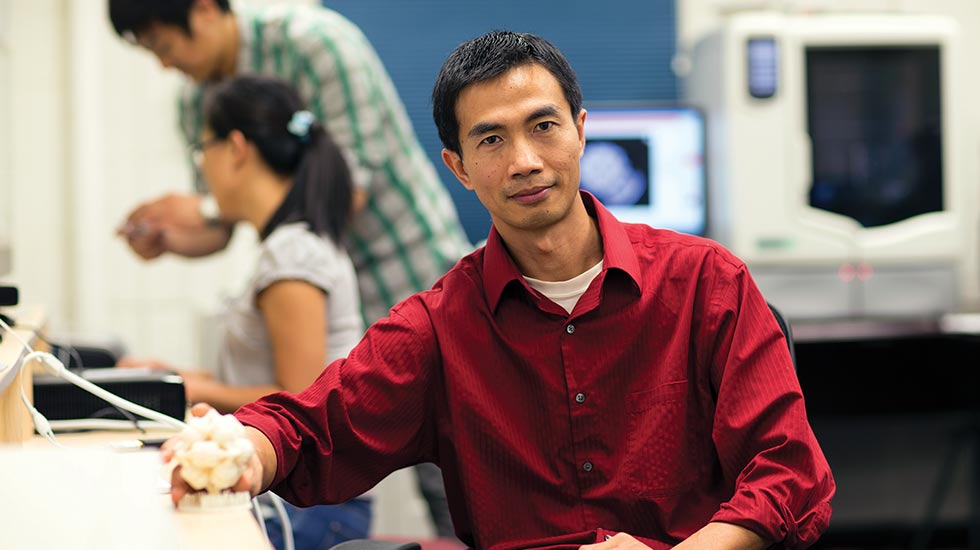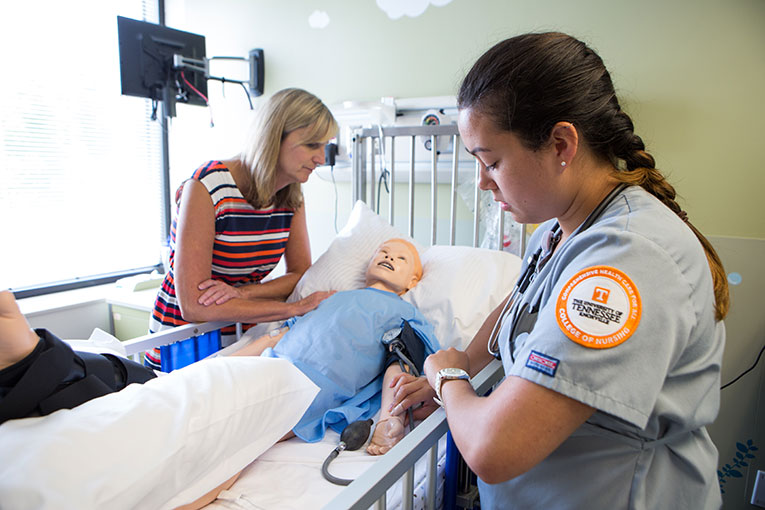UT, East Tennessee Children’s Hospital Partner to Advance Health Science
- UT and East Tennessee Children’s Hospital have established the Health Innovation Partnership Program.
- The program will foster collaboration between the hospital and UT’s colleges of engineering, nursing, and arts and sciences to improve patient care.
- This collaborative “think tank” will allow for UT researchers to use their expertise in executing ideas from health care professionals.
UT and East Tennessee Children’s Hospital (ETCH) have teamed up to create a program with the goal of developing innovations to implement at East Tennessee Children’s Hospital and other hospitals with similar goals.
The Health Innovation Partnership Program (HIPP) will foster collaboration between experts from UT’s College of Nursing, Tickle College of Engineering, and School of Art, and ETCH in an effort to improve everything from patient wait times to recovery from surgery.
“Innovative ideas help a hospital run more efficiently,” said Susan Fancher, clinical instructor and simulation director in nursing. “We want to help ETCH make even better impacts on patient lives. Some of what the UT team will do is teach simulation best practices. Staff who practice skills in a safe simulated learning environment maintain competencies and work together as a team more effectively.”
She said that HIPP will focus on two main areas: Helping the hospital define their problems and needs, and helping them learn processes that address those problems and needs.
“It takes partnerships like this to advance the care we provide within our health system,” said Hella M. Ewing, vice president of patient care services and chief nursing officer at ETCH. “Matching experts at the bedside with the experts at HIPP will allow a synergy to develop creative solutions to the problems that are frustrating and impede efficient quality care. The response from the staff, physicians, and leadership has been very positive.”
One of the driving concepts behind HIPP is that people in the medical field often have great ideas for improving patient care or processes but seldom have the time and tools to develop their ideas.
Sarah Lowe, a professor of graphic design in the School of Art, will teach stakeholders at ETCH—including administrators, educators, providers, and patient advocates—to learn design process thinking, helping to give ETCH the means to develop innovative products or processes to improve care.
Xueping Li, an associate professor of industrial and systems engineering, brings his technological expertise to the project to help develop some of those ideas.
“They have good ideas, but no time,” said Li. “We have the time, research, and students to put their ideas to life.”

He previously worked with Fancher and Tami Wyatt, nursing associate dean of research and Torchbearer Professor, to develop the Health, Innovation, Technology, and Simulation Laboratory—or HITS Lab—at UT, where some training and testing will occur.
Once the HIPP team defines the problem and possible solution, engineering will work out the technical aspects, nursing will focus on the real-world constraints and needs, students will test the new methods or technology, and art will help make it consumer friendly.
Li stressed that the first step toward success is having buy-in and understanding at the executive level before taking it down through the ranks, and that they should consider that even the smallest changes can have major impacts—something echoed by Fancher.
“George Herman Ruth once said, ‘Yesterday’s home runs don’t win today’s game,’” said Ewing. “Having hit 714 home runs, Babe Ruth is revered as one of the greatest baseball players of all time, and just as he reinvented his sport we must never stop reinventing ourselves. We must continue to question the norm and develop solutions for our problems. Through innovated ideas, we can effect change in our pediatric environment and may be able to help other pediatric facilities that suffer from the same problems.”
“Matching experts at the bedside with the experts at HIPP will allow a synergy to develop creative solutions to the problems that are frustrating and impede efficient quality care. The response from the staff, physicians, and leadership has been very positive.”
—Hella M. Ewing
Using a race car pit crew analogy, Fancher pointed out that something as small as the actions of the person who fills tire pressure can drastically change the outcomes for the driver, so it is essential to practice in a team before the race occurs.
“Even things like how well you have your cleaning crew trained for particular areas of the hospital can impact a patient’s experience,” said Fancher. “We want them to consider all possibilities and become their own best advocates.”
Li said Wyatt was key in developing the idea and building momentum for the new project.
“Wyatt brings experience in innovation labs after touring the country and observing different ways and approaches of doing things,” said Li. “She saw other areas where health care, technology, and innovation were building partnerships and she wanted to bring that here.”
“With contacts in places like Boston, Cincinnati, and Orlando, we can learn from the best of the best and integrate innovation into the fabric of health care here in East Tennessee,” said Wyatt.
Li also credited Stacey Patterson, UT’s vice president of research, outreach, and engagement and president of the UT Research Foundation, for her support and enthusiasm for the project.
Contact
David Goddard (865-974-0683, david.goddard@utk.edu)
